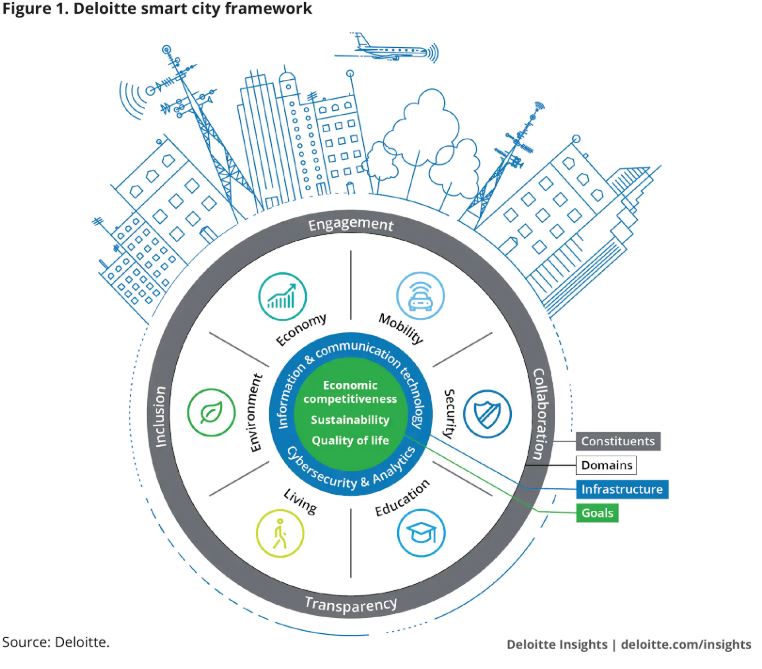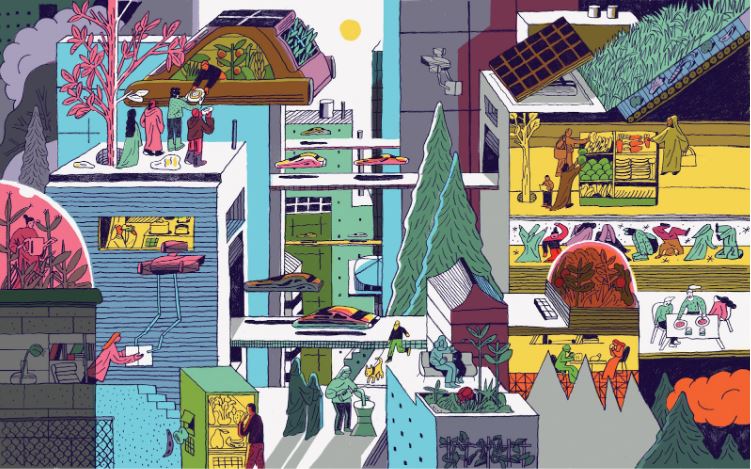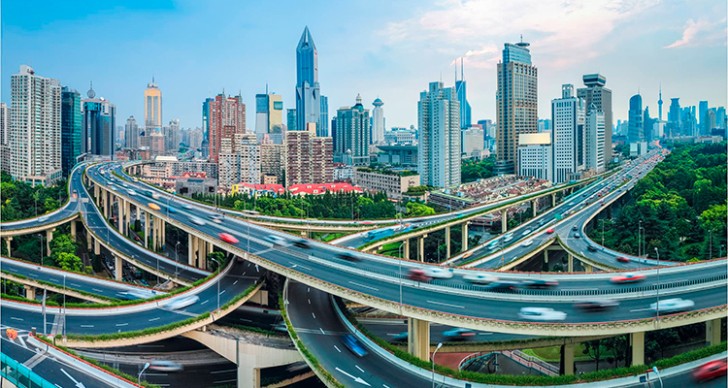 We are going through a change of an era, a historical moment in which transformations alternate the living patterns of contemporary times, and the economic and social model that we have known is coming to an end.
We find ourselves before a new paradigm, the paradigm of technology and information science which, in a globalized world, expands and replicates any novelty at a speed unknown until now, and which continues to grow without limits. This new paradigm will transform the everyday life of people, as well as the economy, leisure, social models, labor market, politics, in short, it will transform all aspects of our reality, and therefore, our cities.
We are going through a change of an era, a historical moment in which transformations alternate the living patterns of contemporary times, and the economic and social model that we have known is coming to an end.
We find ourselves before a new paradigm, the paradigm of technology and information science which, in a globalized world, expands and replicates any novelty at a speed unknown until now, and which continues to grow without limits. This new paradigm will transform the everyday life of people, as well as the economy, leisure, social models, labor market, politics, in short, it will transform all aspects of our reality, and therefore, our cities.
CITIES AS A GAME BOARD
The polyhedral and global transformation processes (social, economic, political, labor, etc.) that we are living and will live in the coming years will take shape in the cities. The cities will have to face a great challenge of growth and find a way to guarantee their sustainability when it comes to energy, environment, food, social, and economic well-being.
Changes and transformations reproduce and expand most rapidly in larger territories. That's why the cities have always been the hotbed for innovation. It is foreseen that, in the new global scenario, the cities and their protagonism will grow considerably. For example, the prominence of nation-states is likely to shift towards nation cities.
All the technological innovations will be developed, implanted and deployed in these cities: Artificial Intelligence, Big Data, IoT, Robotics, 5G, etc. And, therefore, it is here where the game of the development of this new era will play out.
HUMANISM AT THE CENTER OF THE OBJECTIVES
The South Korean philosopher Byung-Chulhan has said that nowadays, one exploits oneself while believing one has realized oneself. In the context of smart cities, it means that it is crucial not to forget that the citizens must always be at the center of the change.
There is no point in talking about circular economic processes in the management of the water cycle, to give an example, of its optimization and efficiency if a significant percentage of the citizens cannot pay the water bill, and therefore have no access to this resource.
It is fundamental to establish objectives that respond satisfactorily to the challenges that the Cities 4.0 pose. Objectives must be defined and executed with a strategy because their realization will not be easy. Keeping up with the speed of new developments is going to be difficult but necessary. Xavier Marcet has said referring to the new companies: "we must improve the performance of our bicycle without stopping pedaling" and the same applies to new cities.
The defined objectives must attend to the improvement of life of the people who will mostly live in the cities. Those objectives must procure that cities expand with humanist criteria recovering fundamental values. The implementation of collaborative models and environmental awareness are good examples of such criteria.

Image source: https://foodandcity.org
TECHNOLOGY, THE VEHICLE OF CHANGE
Technology is the most powerful tool that will allow us to implement the objectives of which we spoke before. It's also the safeguard for the same purposes. It's worth remembering that the technology we're talking about expands and develops exponentially every second in every corner of the world.
The expansion and development of all technologies —such as data that has already converted into the new oil of the 21st century, the reuse of natural resources without the loss of a single unit or measure, robotics or AI among others, and new infrastructures for the deployment of these technologies, such as new telecommunications networks— can turn all our objectives into reality.
We need to ask the right questions, define what our objectives as a city are and stay calm because the technology to make them possible already exists in some corner of the world, and if it doesn't yet, it will exist soon enough.
The explosion in the development of technology is what brings us to this new era; the new paradigm of technology allows us to find solutions to all our questions, and expand them all over the planet thanks to the globalized world we live in.
But never should we forget that technology is the vehicle, never the objective. Because if we do, moral, ethical, political, economic or social debates will be decided here, and that would be a huge mistake.
KNOWLEDGE AND LEADERSHIP
What is the best tool to respond to these new challenges? How can we generate criteria for correct decision-making in the face of all the possibilities we are going to encounter? The answer lies in knowledge.
Knowledge expands with the help of technologies. There are thinkers and scientists developing theories at a speed like never before, thanks to technology. It is necessary to develop these models in a global, shared, holistic way. To structure that knowledge is the pending subject.
Technological advances make it possible to develop many fields that we have already mentioned, such as robotization, energy efficiency, or the recycling of an increasingly scarce good, such as water. We must be aware that the implementation and development of these trends and new realities can generate an extremely valuable impact in different fields, and therefore generate multiple synergies. This, in turn, has implications for organizations in the private and public sectors.
Therefore, the structuring of knowledge to optimize the actions carried out by organizations is a great tool to improve their records and achieve their objectives. And what do we do with that structured knowledge? How do we put it into practice? The answer is to make it available to decision-makers through its dissemination and academic training.
The reality of the new cities is a holistic, multidisciplinary and multi-faceted one. Therefore, we cannot have an authoritarian vision or leadership. The new managers of the cities, public and private, must have the necessary knowledge in each of the fields that form part of that management. As they cannot be experts in all of them, they must lead transversal and collaborative teams and projects. The new manager, executive or, in short, the new leader, will be the one who has the widest and most global vision of all areas of the city.
This is the idea behind the project that Zigurat Global Institute of Technology and the think tank Knowurbannet have started jointly: to give life to an international master's degree that brings together experts of recognized prestige in their different professional fields to share their knowledge and educate the new leaders of the 21st century. This training will allow the students to acquire the knowledge necessary to lead these new cities, the Smart Cities, to turn them into places that are technologically, environmentally, economically and socially optimal for citizens.
CONCLUSION
We are facing a change of era that has been baptized in many ways: the fourth industrial revolution, the digital era or that of Smart Cities. There have been other historical moments of equal significance, such as the renaissance or the industrial revolution but this time everything takes place at a speed unknown until now, due to the exponential development of technologies and the effect of globalization.
As of today, our biggest challenge will be to face advances faster than our compression capacity. That is also why often they are implanted in their most superficial modes as gadgets or devices.
But all the possibilities offered by this new digital paradigm embodied in the management of cities can also mean a breakthrough in the quality of life of citizens. In our quest to tame the technologies and put them in the service of smart cities, it is necessary to follow an order:
- First of all, the people! We must define the objectives from their point of view and we must do it collaboratively, with the maximum possible participation of all: universities, public administration, citizens and companies.
- Second, define the strategy for the execution of these objectives; a strategy that will no longer be rigid and sacrosanct, but flexible and continuously revisable.
- Thirdly, the appropriate selection and implementation of the technology. The speed at which technology develops allows us more possibilities than we can currently imagine.
The development of technology offers us a new variable and proposes new objectives that we must observe from humanist criteria. Once we have been through them, we turn to technology to execute them. We can use the data currently available to us, to predict the future. Ergo, we can foresee the harmful effects or negative impacts for the people and correct them before putting them into practice, improve decision-making. It will also be hard to ignore some of the secondary effects that will occur in the implementation of these changes.
We are facing major challenges in the new cities 4.0, changes that are not going to be cosmetic or superficial, they are going to be profound and structural, and therefore it will be essential to define well the objectives, strategies and correct decision-making. These criteria can only be achieved through knowledge, the more and greater, the better; the knowledge that we will live continuously and that, in a very positive way, will allow us to correct the mistakes.


 We are going through a change of an era, a historical moment in which transformations alternate the living patterns of contemporary times, and the economic and social model that we have known is coming to an end.
We find ourselves before a new paradigm, the paradigm of technology and information science which, in a globalized world, expands and replicates any novelty at a speed unknown until now, and which continues to grow without limits. This new paradigm will transform the everyday life of people, as well as the economy, leisure, social models, labor market, politics, in short, it will transform all aspects of our reality, and therefore, our cities.
We are going through a change of an era, a historical moment in which transformations alternate the living patterns of contemporary times, and the economic and social model that we have known is coming to an end.
We find ourselves before a new paradigm, the paradigm of technology and information science which, in a globalized world, expands and replicates any novelty at a speed unknown until now, and which continues to grow without limits. This new paradigm will transform the everyday life of people, as well as the economy, leisure, social models, labor market, politics, in short, it will transform all aspects of our reality, and therefore, our cities.

